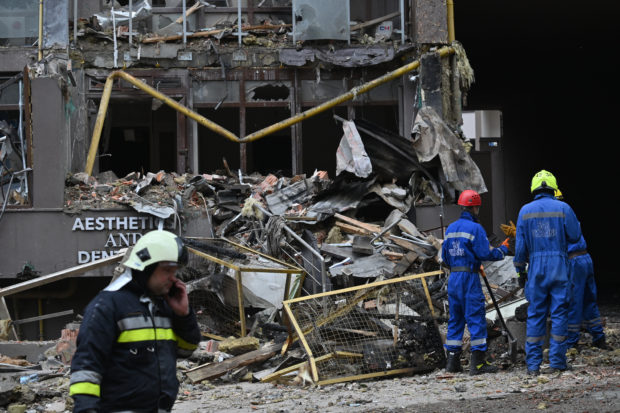War in Ukraine: Latest developments

Ukrainian rescuers work outside a damaged residential building hit by Russian missiles in Kyiv on June 26, 2022, amid Russian invasion of Ukraine. AFP
KYIV—Here are the latest developments in the war in Ukraine:
Kyiv strikes
Russian strikes hit a residential building in Kyiv in the first attack on the capital in almost three weeks, Ukraine says.
One person died and four people, including a seven-year-old girl, were taken to hospital following the early morning strikes, says city mayor Vitali Klitschko.
The top three floors of a building in the Shevchenkivsky neighbourhood were completely destroyed and several fires broke out, spewing thick smoke.
Russia says it targeted missile factory
Russia says its strike on Kyiv hit a weapons factory, dismissing as “fake” reports that it struck a residential area of the Ukrainian capital.
Article continues after this advertisementThe Artyom factory “was the target, as military infrastructure”, the Russian defence ministry says, adding that it had already been targeted in April.
Article continues after this advertisementRussia claims strikes in north and west
Russia says its forces carried out strikes against three military training centres in northern and western Ukraine, including one near the Polish border.
“High-precision weapons of Russia’s aerospace forces and Kalibr missiles” were used, Russian defense ministry spokesman Igor Konashenkov says.
Among the targets was a military training center for Ukrainian forces in the Starychi district of the Lviv region, around 30 kilometers (19 miles) from the border with Nato member Poland.
The other two training centers were in the central Zhytomyr and northern Chernigiv regions.
Konashenkov did not say when or from where the missiles were fired.
But Kyiv on Saturday said Russia had carried out strikes from Ukraine’s northern neighbour Belarus. Moscow did not comment on the claim.
Britain warns against settling conflict now
In talks with French President Emmanuel Macron, British Prime Minister Boris Johnson warns “any attempt to settle” the Ukraine conflict now risks prolonging instability and emboldening Russian leader Vladimir Putin.
On the sidelines of the G7 summit, both leaders “agreed this is a critical moment for the course of the conflict, and there is an opportunity to turn the tide in the war”, Downing Street says.
But Johnson cautions that “any attempt to settle the conflict now will only cause enduring instability”.
Allies won’t ‘splinter’
World powers agree to ban gold exports from Russia, kicking off a G7 meeting aimed at taking new steps to deplete Moscow’s war chest and bolster Ukraine’s defences.
US President Joe Biden and his counterparts from the world’s most industrialized nations are gathering at Elmau Castle in the German Alps, before talks with Nato partners in Madrid.
“We have to stay together,” Biden tells German Chancellor Olaf Scholz, the host of the three-day gathering.
Putin had been hoping “that somehow Nato and the G7 would splinter”, Biden says. “But we haven’t and we’re not going to.”
Arms for Ukraine
Following strikes on Kyiv, the Ukrainian government calls for G7 leaders meeting in Germany to provide more weapons — and impose further sanctions against Moscow.
“G7 summit must respond with more sanctions on Russia and more heavy arms for Ukraine. Russia’s sick imperialism must be defeated,” Foreign Minister Dmytro Kuleba tweets.
Canada deploys warships
Canada deploys two warships to the Baltic Sea and North Atlantic, joining a pair of frigates already in the region, to reinforce Nato’s eastern flank in response to Russia’s invasion of Ukraine.
Her Majesty’s Canadian Ships (HMCS) Kingston and Summerside set sail for a four-month deployment as part of “deterrence measures in Central and Eastern Europe” launched in 2014 after Moscow annexed Crimea, the Canadian navy says in a statement.
G7 leaders mock Putin
World leaders mock Putin’s tough-man image at a G7 lunch in Germany, joking about whether they should strip down to shirtsleeves — or even less.
“Jackets on? Jackets off? Do we take our coats off?” Britain’s Johnson asks as he sits down at the table in Bavaria’s picturesque Elmau Castle, where Scholz was hosting the summit of seven powerful democracies.
Canada’s Prime Minister Justin Trudeau suggests they wait for the official picture before disrobing.
RELATED STORIES
Nato to pledge aid to Baltics and Ukraine, urge Turkey to let in Nordics
Indonesian president to meet Zelensky and Putin to urge peace talks
Far from home, Russian exiles help Ukrainian refugees